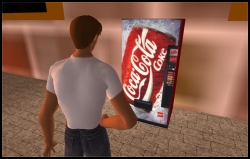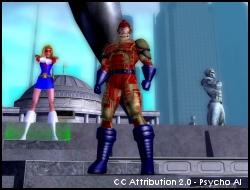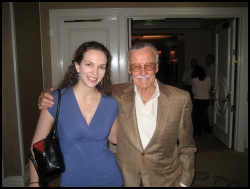Conference Report: California Bar IP Section “Entertainment & Media” (and Stan Lee!)
July 16th, 2008 by Thayer Preece
 Last month, attorneys from across the state of California gathered in the posh Beverly Hills Hotel, vacation home of the stars, for the Intellectual Property Section of the California State Bar’s conference on Entertainment & Media. (With special guest appearance by Stan Lee!) The panels included one on the law and virtual worlds. (That wasn’t the one with Stan Lee.) The virtual worlds panel consisted of in-house attorneys from Fox, Disney, and Sony, and was moderated by James Nguyen, an attorney who represented Marvel in their lawsuit against NCsoft, makers of the game City of Heroes. (But did I mention… Stan Lee?)
Last month, attorneys from across the state of California gathered in the posh Beverly Hills Hotel, vacation home of the stars, for the Intellectual Property Section of the California State Bar’s conference on Entertainment & Media. (With special guest appearance by Stan Lee!) The panels included one on the law and virtual worlds. (That wasn’t the one with Stan Lee.) The virtual worlds panel consisted of in-house attorneys from Fox, Disney, and Sony, and was moderated by James Nguyen, an attorney who represented Marvel in their lawsuit against NCsoft, makers of the game City of Heroes. (But did I mention… Stan Lee?)
As you can probably guess from the group of people discussing the issue—this conference was very much geared towards content-providers. The panels mainly focused on how content-providers can protect their IP against infringement and avoid liability for their users’ actions. Technologies such as YouTube and Napster were largely reviled. At the risk of angering the representative from Fox, the discussion that ensued was not exactly “fair and balanced.” As a younger attorney who uses tools like YouTube and file sharing programs on a regular basis, I naturally felt a bit out of place. It was, however, interesting to hear a different point of view than I am usually exposed to, and it was worth the whole  trip down there to meet Stan Lee (whose presentation had nothing to do with the law, but was incredibly interesting nonetheless).
trip down there to meet Stan Lee (whose presentation had nothing to do with the law, but was incredibly interesting nonetheless).
At the beginning of the conference, a disclaimer was made that although the speakers represent their companies as attorneys, in the context of the conference, they are not speaking on behalf of the companies they work for, and their views might not reflect those of their employers. That said, it was obvious that the various speakers’ employment situations colored their views on the law considerably, and it was worth keeping in mind that their opinions might have been influenced by their employers’ legal issues.
Overview of Virtual Worlds
The presentation began with a simple overview of some of the main virtual worlds that are out in the marketplace. Second Life was the obvious place to begin (and the SL Bar Association was mentioned) [Editor's note: that's pretty cool...] but nods were also given to V-MTV (a world of beaches, cars, and MTV television programs), Habbo Hotel (popular among the teenage crowd), There (which actively courts advertisers for real life products), and Girl Sense (focusing on fashion and makeovers). Paramount got a shout-out for using virtual worlds such as Habbo Hotel to promote its goods (a representative from Paramount had been a speaker in a previous panel).
The panel then moved on to MMORPGs such as World of Warcraft, Everquest, and City of Heroes. This paved the way for the panel representatives to promote some of their companies’ own offerings such as Disney’s Pirates of the Carribean Online and Toontown Online, or Sony’s Home.
Details of the session (and a picture of me and Stan Lee) follow.
Ownership Issues
The primary question contemplated by the panel was the matter of ownership. There are a number of elements of a virtual world that are subject to ownership by a party—avatars, environments, game features, levels, names, artwork and object design, fashion, etc. Who can claim ownership of these elements, and even beyond that, is it wise for the content provider to assert ownership over these elements from a legal standpoint?
The panel seemed to find a disparity between the way that virtual communities (e.g., Second Life) and online games (e.g., WoW) handle ownership issues. In general, it seemed that virtual communities would disclaim ownership of user-created content, but keep rights in the elements that the company had created. This strategy is due to the fact that under the DMCA, there is a risk that the company could be held liable for the actions of its users.  For example, if a user creates a bottle of Coca-Cola in Second Life, Linden Lab does not want to assert ownership in that object, or they could potentially be looking at liability for trademark infringement.
For example, if a user creates a bottle of Coca-Cola in Second Life, Linden Lab does not want to assert ownership in that object, or they could potentially be looking at liability for trademark infringement.
On the other hand, in games there is generally a lot less content that is created by the user. As a result, the software license agreements for MMORPGs generally retain all rights, including user-created content, in the game creator. The representative from Disney speculated that this is because while communities are primarily about user-created content, games are mainly populated by the game company, and they want to retain control over what exists in the game world.
There is a balancing act that the content provider must engage in—weighing the risk that their control over the IP in the game could lead to liability under the DMCA, and the desire to control what can and can’t be done with the content of the world. Usually the outcome that results is a claim of ownership but with caveats. The ultimate outcome will depend on the specific situation and the priorities of the company that is making the decision.
DMCA Issues
As mentioned above, one of the primary concerns of the content provider is the risk of liability under the DMCA. The DMCA provides safe harbor provisions for ISPs, but then the issue becomes whether a software company providing a virtual world qualifies as an ISP under the statute.
 Due to his experience, the moderator here used the City of Heroes litigation as an example. For those who aren’t aware, Marvel sued the makers of the game City of Heroes several years ago based on the fact that players of that game could use the character creation engine to create characters that closely resemble Marvel’s superheroes.
Due to his experience, the moderator here used the City of Heroes litigation as an example. For those who aren’t aware, Marvel sued the makers of the game City of Heroes several years ago based on the fact that players of that game could use the character creation engine to create characters that closely resemble Marvel’s superheroes.
The question posed to the panel was, if they claim ownership of all user-created content, can they still take advantage of the safe harbor provisions of the DMCA? The panel was fairly indecisive on the issue. The Sony rep stated that because there is no law on the subject, it would be hard to say. Fox’s attorney contributed that it would depend what was done with the ownership. There needs to be control plus something more.
Because the moderator represented Marvel, it was fairly obvious that he believed that City of Heroes should not have been able to use the safe-harbor provision, but the case settled before the judge made a ruling on that issue. The DMCA was designed to protect ISPs from passive acts (such as its users posting copyrighted content on a message board), but ownership increases control and makes it harder to claim passivity.
The discussion then turned to the Bragg v. Linden Lab case, where Linden Lab confiscated Bragg’s virtual property in the virtual world of Second Life. The case was decided based on jurisdiction rather than content. Disney’s attorney commented that the decision by the judge not to enforce arbitration provisions in the EULA made other content-providers extremely nervous—if that provision was unenforceable, then others might be too, and that opens the company up to a much greater chance for liability. He also pointed out that it is difficult to define ownership through a contract, and the actual practices become based on the goals of the program.
Fox’s attorney pointed out that Second Life strives to be different in ownership issues from other, more controlling virtual worlds. But because there is such a difference between the ratio of content producers to content consumers in a virtual world as opposed to the real world, different rules are able to work in that world that might not work in real life. In Second Life, practically every inhabitant is a content-creator, making various objects and environments for the world, whereas in real life, there are a limited number of people creating the works that are  consumed by a much larger audience, thus leading to a need for more comprehensive enforcement tools.
consumed by a much larger audience, thus leading to a need for more comprehensive enforcement tools.
The panel took a brief interlude while the moderator showed the audience (after a disclaimer that the easily offended may wish to avert their eyes), a video of the famous Anshe Chung flying-penises Second Life griefing event, which ended up widely viewed on YouTube. The target of the griefing incident submitted a takedown notice to YouTube based on copyright rights in her avatar’s image. The panel all agreed that she has protectable rights in her avatar’s image, however, the takedown actually backfired by creating more publicity around the event, and copies of the video multiplied rather than decreased.
Trademark Issues
The panel conducted a brief discussion of trademark issues in virtual worlds, mainly focused on the question of whether use of a mark in a virtual world constitutes use of a mark in commerce. As background, in order to qualify as trademark use, the mark must be used “in commerce.” The exact definition of what constitutes commercial use is one that is being constantly debated in lawsuits. The consensus of the panel was that it would depend on what goods or services were being claimed under the mark. One could possibly employ a virtual use to show use in commerce of a service such as designing furniture for virtual environments, but if Coke tried to register a trademark for soda based on virtual use, it would probably fail.
The panel also touched on the issue of whether an avatar’s name could constitute trademark infringement. The general answer appeared to be no, due to the fact that there was no use in commerce—the users of the virtual world are generally not using their avatars’ names in order to promote or identify goods or services. However, the more distinct a name, the easier it would be to protect against potential infringement.
 For a while, there was a website purporting to be the “Second Life Patent and Trademark Office,” which would help users protect their IP by providing proof of creation dates, and housing a registry system for limited edition products in order to identify counterfeits. The site has since been taken down, citing Linden Lab’s new trademark policies as the reason. The panel was puzzled, however, by how this organization could act as a patent and trademark office with no kind of official enforcement power.
For a while, there was a website purporting to be the “Second Life Patent and Trademark Office,” which would help users protect their IP by providing proof of creation dates, and housing a registry system for limited edition products in order to identify counterfeits. The site has since been taken down, citing Linden Lab’s new trademark policies as the reason. The panel was puzzled, however, by how this organization could act as a patent and trademark office with no kind of official enforcement power.
 Conclusion
Conclusion
In the end, the discussion turned out to be fairly one-sided, with the panel agreeing with each other on pretty much every issue, always on the side of the content-creator. Nevertheless, it was interesting to hear that point of view, even if one doesn’t necessarily agree with it. With the discussion concluded and my picture with Stan Lee taken, I then turned my attention to a comparison of the cupcakes from Sprinkles and Crumbs, but that’s a story for another day.
Related Posts on Virtually Blind
- Xfire “Virtual Gold & Real Money” Debate Today: "[Editor's Note: If you missed this event, Xfire has made a transcript..." (2 comments)
- MDY Agrees to Pay Blizzard $6m in Damages in World of Warcraft Bot Lawsuit, Pending Appeal: "MDY Industries has agreed to pay World of Warcraft creator Blizzard ..." (53 comments)
- Panel on Virtual Worlds at ABA Annual Meeting in NY: "If you're attending the American Bar Association's annual meeting in..." (0 comments)
5 Responses to “Conference Report: California Bar IP Section “Entertainment & Media” (and Stan Lee!)”
Leave a Reply
Notes on Comments: Your first comment must be manually approved, but after it is you'll be able to post freely with the same name and email. You can use some HTML (<a> <b> <i> <blockquote> etc.) but know that VB's spam blocker holds posts with five or more <a> links. VB supports gravatars. Got a gravatar? Use the associated email and it'll show with your comment. Need one? Set it up for free here.



With this post, VB welcomes back popular guest writer Thayer Preece. I still can’t believe you got a picture with Stan Lee.
WB Thayer. Sounds like a fun convention.
I wonder how Stan feels about Marvel completely missing the boat (again) on MMOs. Although I think Champions Online will be a blast (Champions originally started as Marvel Universe Online), it won’t satisfy any comic fans’ desire to see Marvel’s giant universe of characters in an MMO.
Maybe the upcoming DC Online will help them find their way…
Unfortunately, they didn’t leave almost any time at the end for questions, so we may never know.
Who’s Stan Lee?
Bragg versus Linden seemed to be nothing more than a media stunt. Bragg scammed by using an exploit in the Second Life website and had the pretention of going to court over it. The entire case got blown up in the media which shouldn’t have been the case. The impression remains that both parties just enjoyed the media attention.